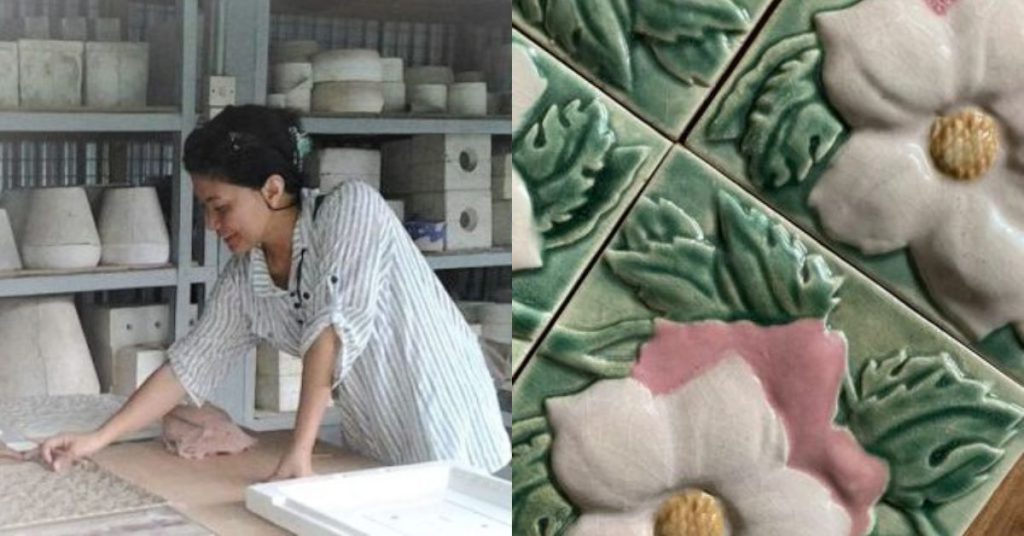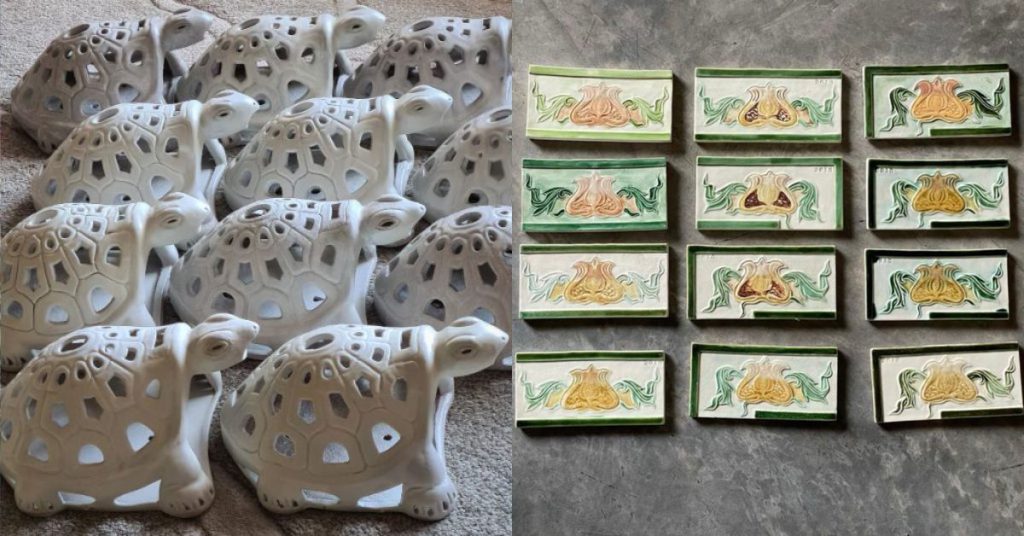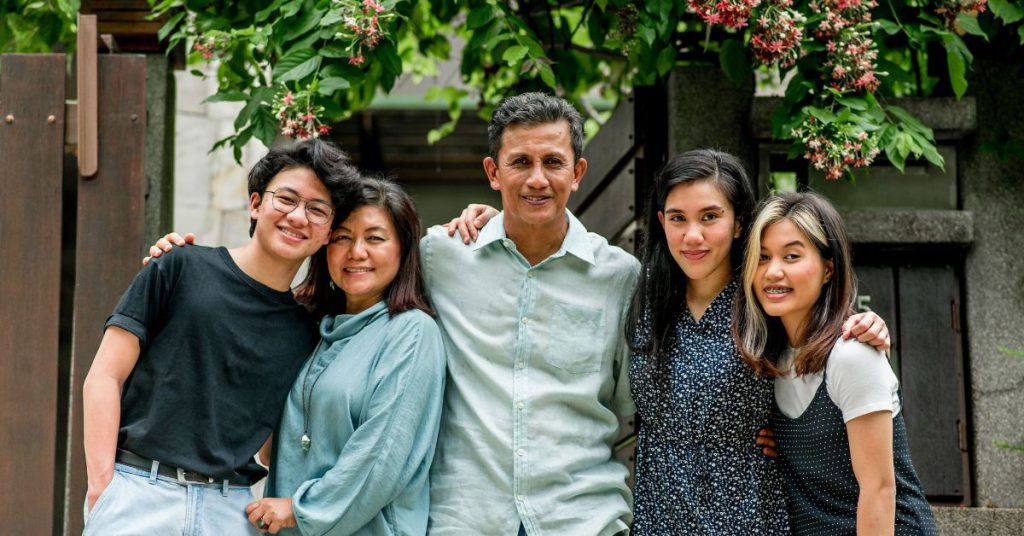If you had to describe your mother in two words, what would you say?
For Zulaika Arfudi, the answer is simple: “opportunistic creative”. To her, her mother, Datin Rosmah Yaakub, is a classic entrepreneur with the ideals of an artist.
“If you serve her a good cake at home, she will try to convince you to sell it,” Zulaika shared. “She will always try to find value in every creative deed.”
This is a trait that Zulaika believes aided her mother’s success with Kéceramics as a designer and manufacturer of quality handcrafted ceramic products.
Other than ceramic tiles and trinkets, the brand also does breathtaking ceramic murals found in various F&B spots, including a Nando’s outlet at The Starling Mall.
From urban planning to ceramic making
Datin Rosmah Yaakub, the founder of Kéceramics, wasn’t always in the creative business, even though she had always been artistically inclined.
In the early 1980s, she was in Australia as a scholarship student. Although she had wanted to study interior design, such a major wasn’t made available for a scholar at her level.
“She had to pursue STEM-related degrees as a government-sponsored scholar,” Zulaika explained.
Thus, Datin Rosmah ended up settling for Urban Planning at the University of New South Wales. Still, her interest in creating and designing crafts remained.
“She used to tell me stories of the lively craft flea markets that she used to go to as a student in Sydney and how they became parts of her inspiration to start a small creative business,” Zulaika recalled.

When Datin Rosmah returned from Australia, she got her first job as a town planner in KL. Even then, though, she never let go of her creative streak and was doing batik-making as a hobby.
Apparently, this was how she ended up stumbling upon a random weekend ceramic course. Here, she created some samples that gained the attention of Kraftangan Malaysia, which is the Malaysian Handicraft Development Corporation. This resulted in her first ever ceramic order supposedly being valued at RM3,500 in 1993.
“And just like that, she began producing ceramic on the kitchen table of our small SS19 Subang Jaya terrace house while raising a one-year-old me,” Zulaika said. “She eventually quit her town planning job in the same year to pursue the business full-time.”
From mother to daughter
As they grew up, Zulaika and her sister, Melissa, began helping their mum with the ceramics business.
“It has become an accidental family business!” Zulaika, the older of the two, joked. “We started helping randomly at one point and never clocked out.”
Jokes aside, Zulaika said there was never any pressure for the children to take over the business, but rather, it was always something they had taken pride in.
Like their mum, Zulaika and her siblings have always had creatively inclined passions. While Zulaika has always been into literary arts, Melissa does music part-time and has a baking business on the side. The youngest, Ikmal, is into culinary arts.

“Our parents are pretty chill and have always encouraged us to pursue our dreams, even when these dreams change every other year,” Zulaika shared. “We are very blessed to have this freedom.”
Nowadays, Zulaika and Melissa are working on Kéceramics full-time, something that was spurred on by struggles due to the pandemic.
The sisters felt responsible to keep their mother’s business running and even saw potential for its growth. Furthermore, the timing was right—Zulaika had just returned to Malaysia after living and working in Norway for four years.
Today, Zulaika and Melissa share the workload, with Melissa taking charge on the client side of things such as managing custom work inquiries, consulting with designs, and overseeing custom projects.
Zulaika, on the other hand, is more focused on managing retail sales and marketing.
Their mother has since partially retired, though she still occasionally drops her own designs and works on her own personal projects. But on the business side of things, Datin Rosmah has entrusted such responsibilities to daughters Melissa and Zulaika.
From 1993 to 2022
Having been established in 1993, Kéceramics has clearly seen some major changes over the years.
According to Zulaika, there are obvious generational differences such as transitioning to online retail, digital marketing, and building a social media presence.
“On top of that, ceramic design trends also come and go as frequently as other trends,” Zulaika added. “While we do have our own design identity, we try to be open to new experiences.”

This design identity is definitely strong, especially with Datin Rosmah at its helm. According to Zulaika, the designer is mainly inspired by patterns, textures, and colours, especially geometric patterns, uneven textures, and rustic colours—three fixed features that Kéceramics designs are primarily based on.
Other than that, the business also deals with customised designs where the team tries to work with clients’ specifications while mixing them with Kéceramics’ own interpretations.
These client projects include mesmerising and intricate ceramic murals and tiles.
Kéceramics’ process is pretty straightforward. It starts by creating a sample, just like Datin Rosmah had done all those years ago in her weekend course. During this sampling process, the team does R&D with specific clay batches, design specifications, and glaze formulations.
It takes multiple test rounds before the team establishes the ideal conditions. After this process, they then develop casts and moulds for the designs.

“And from there, we will fire up a few samples in the kiln, which will go through a few rounds of assessments and changes with clients until they are satisfied,” Zulaika said. “Once the final sample is confirmed, we move on to production.”
“The special thing about handmade ceramic products is the charm of their imperfections,” Zulaika shared. “We opt for handmade tiles instead of machine-produced tiles because we want to have the unique marks of handmade crafts.”
She continued. “In this case, it’s better to be consistently inconsistent and uniquely beautiful, within limits of course.”
From here to the future
“The business has lasted this long due to our adaptability, our entrepreneurial mindset, and genuine passion for the arts,” Zulaika said. “We are always looking for opportunities and creative ways to grow the business.”

However, she admitted that the family is facing its biggest challenge right now.
“We are trying to build up the business again after the pandemic,” she said. “With some new changes and adjustments to our brand this year, we hope that we could regain our pre-pandemic performance and go higher.”
With that said, the 30-year-old said their proudest achievement is surviving the last two years, as it hasn’t been easy.
But fueled by the family’s passion for creativity and entrepreneurship, now led by Zulaika and Melissa, Kéceramics seems to have a bright future ahead of itself.
Featured Image Credit: Kéceramics











